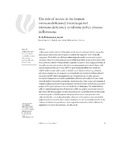The role of nurses in the human immunodeficiency virus/acquired immune deficiency syndrome policy process in Botswana

View/
Date
2003Author
Phaladze, N.A.
Publisher
International Council of Nurses. http://www.ingentaconnect.com/content/bsc/inr;jsessionid=81ud25de419e.alexandraType
Published ArticleMetadata
Show full item recordAbstract
In Botswana, there is dearth of literature on the role of nursing in health-care policy
and resource allocation and yet nurses constitute the majority (85%) of health
manpower. The health-care delivery system depends mostly on nurses for service
provision. There were two main purposes of this study: first, to gather descriptive data
from major key players (with particular emphasis on nurses) concerning knowledge of
the policy process and resource allocation for management and care of clients with
human immunodeficiency virus (HIV)/acquired immune deficiency syndrome
(AIDS) in Botswana; and, second, to identify nurse characteristics (e.g. position,
education, experience, job category) associated with motivation to influence healthcare
policy in HIV/AIDS management and care in Botswana. A policy process
conceptual framework was used to guide data collection and analysis. A case-study
research method was used to conduct in-depth interviews from a purposive sample of
19 policy makers, and a survey questionnaire was used to collect data from a purposive
sample of 95 registered nurses from six study sites in Botswana. The study findings
indicate minimal participation of nurses in health-care policy process and resource
allocation. The demographic variable of position was a predictor of the involvement
of nurses in policy and in budgetary decisions. Both survey and interview data
indicated that this minimal participation of nurses in the policy process resulted in
implementation problems, thus compromising service provision. Implications of the
findings for the nursing profession, nursing practice and policy, which address the
importance of nurses’ involvement, are discussed.
